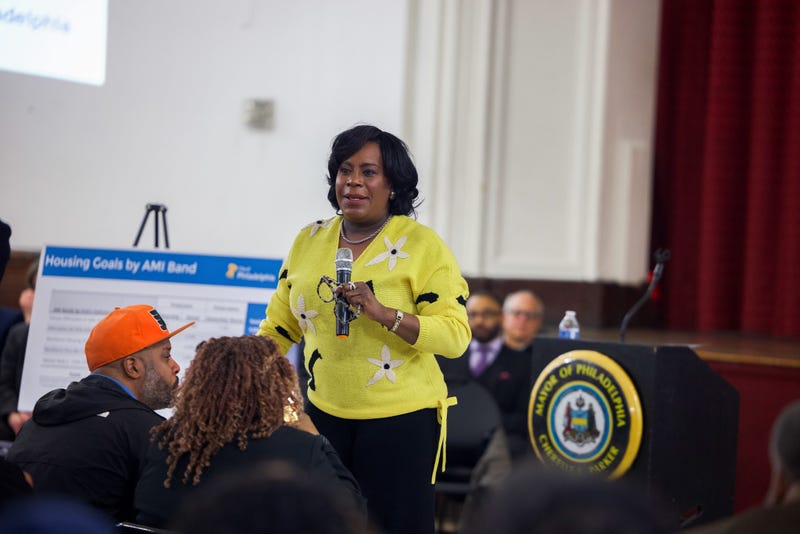
PHILADELPHIA (KYW Newsradio) — As Mayor Cherelle Parker prepares for a day-long hearing this week on her HOME Initiative to build or restore 30,000 units of housing, she sent City Council on Monday a detailed breakdown of how she plans to fund each element of the estimated $2 billion program.
She also provided an extensive 87-page PowerPoint that contemplates zoning and building code changes and “reforms” to the Registered Community Organization (RCO) process, by which community members get to sign off on development in their neighborhoods. No specifics were included, however.
“We are working on things that allow us to promote clarity in the zoning code,” said Planning and Development Director Jesse Lawrence. “There’s a zoning code, but then there’s a series of overlays that honestly might complicate things for developers, so there’s this need to streamline; there’s this need to expedite.”
Most of the funds for HOME (Housing Opportunities Made Easy) come from two bond issues — one this summer and one in November 2027, totaling $800 million. The sales were planned before Trump administration actions roiled the bond market, but Finance Director Rob Dubow said the funds in the five-year plan anticipated some weakness.
“Those actions make the HOME Initiative more essential because they put people’s housing more in doubt, and it means there’s a much bigger need for us to have a really comprehensive program,” Dubow said.
Tiffany Thurman, the mayor’s chief of staff, agreed that the bond sale cannot wait.
“We have a housing crisis,” she said. “It’s urgent.”
A breakdown of how the bond proceeds will be spent shows the largest share goes to housing preservation, including $161 million for gap financing of neighborhood-based rental preservation, $84 million for Basic Systems Repair, and $44 million for a Rental Improvement Fund for small landlords to repair rental properties.
Another large chunk — nearly $80 million — will go toward rental construction. Two programs to help homebuyers with affordable mortgages and settlement costs will each get $50 million.
In all, nearly 40 programs will share the proceeds. There will be a mix of existing and newly proposed programs. New programs include bonding and training for local contractors and programs to help with exterior fix-ups, including a Curbside Appeal and Façade Improvement program that will provide matching grants to communities that want to improve their appearance by planting trees, greening vacant lots, or painting exteriors.
Existing programs that will get new infusions of money include the Philadelphia Accelerator Fund, Turn the Key workforce housing, and Fresh Start PHL, which provides payments to landlords to prevent eviction, various home repair programs, and shallow rent subsidies.
Lawrence suggested expanding Turn the Key would involve some zoning changes.
“The mixed-income neighborhood overlay counters the ability to build Turn the Key housing in certain neighborhoods, so there’s been steps toward making that overlay congruent with Turn the Key and making sure there are exemptions in place,” he said.
City Council, no doubt, will be looking for much more detail on Wednesday, at a Committee of the Whole hearing on the HOME Initiative.
CORRECTION: A previous version of this article included an incorrect bond issue date. The current version reflects that change.
